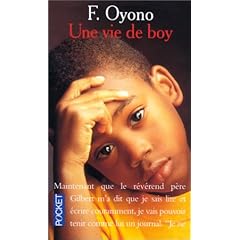
Une Vie de Boy (Ferdinand Oyono) - a beautiful novel - has been written in the diary form, making it much more realistic and lending it a more personal touch thus making the reader feel like he's privy to the innermost thoughts of the main character, in this case Joseph Toundi a.k.a the Boy.
Houseboy or Une Vie de Boy narrates the story of a young Black who runs away from his tribal village, enamoured by the Whites and gets himself "adopted" by a White priest and taken to the Missionary in Dangan, Cameroon. Educated by the priest he starts recording everything he experiences, sees and thinks vis-à-vis his life in colonial Africa as a young black servant. When his benefactor, father Gilbert dies due to an unfortunate accident in the bush (which nevertheless marks him as a martyr for having died in Africa while trying to civilise the savages) he becomes the "Boy" of the Commandant of the colony.
Serving the Whites at the Résidence, the opulent city of the Whites, while he lives in the Quartier Noir (Black Quarter) provides him a vantage point to observe everything around him and slowly his illusions about the Whites are stripped away as he sees their naked truth. The author uses an incident as obviously simple and transparent as the first time Toundi sees the Commandant naked and realises he is not circumcised to illustrate how Toundi's illusions of the nobility and grandeur of the Whites start being stripped away. We see, through Tondi's eyes how the two societies so drastically different are forced to co-exist and are blinded by their stereotypes of the "other."
The novel explores the various questions connected to colonialism and the impact it had on the lives of the natives, especially those like Toundi who tried to cross over and found themselves straddling the fence, having lost the right to return to their native world. Not welcomed into the world of the white coloniser either, they are drawn inextricably into the world of servitude, oppression and eventual obliteration. As Toundi says on his deathbed:
" My mother used to say my greed would take me far. If only I had been able to foresee that it would take me to the cemetry..."An extremely riveting read, this is the second French novel I've read this month and will definitely recommend for its subtle analysis of European colonialism and the resulting clash of cultures, the beautiful descriptions as well as the underlying silence which speaks volumes. F. Oyono has used the African oral tradition masterfully, using it deftly to present the reality of the colonised.
PS Yes the review in french shall soon go up on Accros de Français

